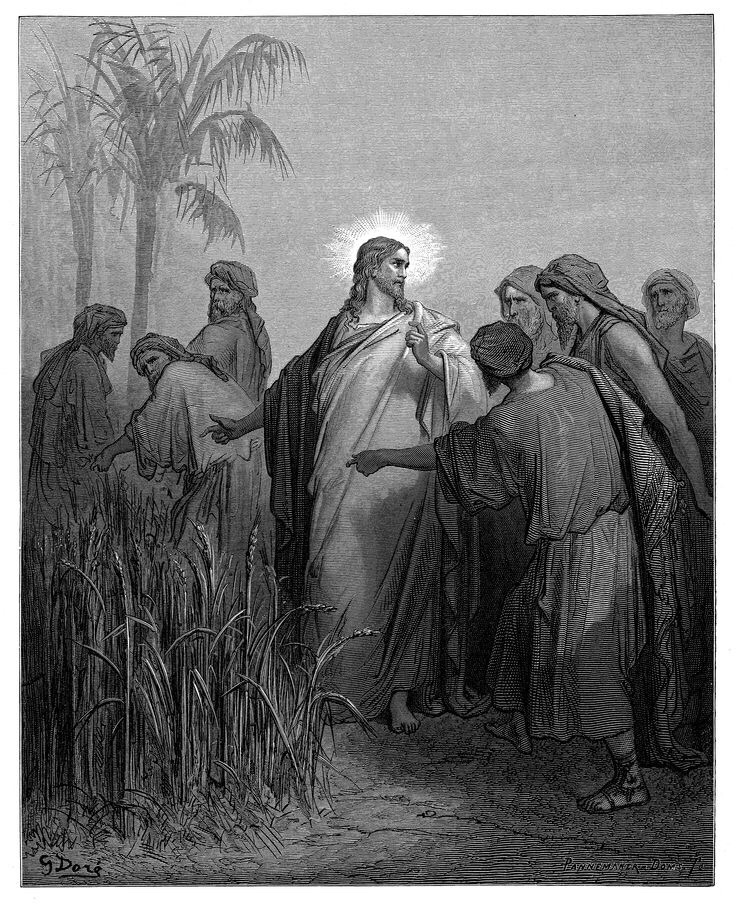The following was published in the 14th Ave. Church of Christ bulletin on 7 January 2018.
Jesus proclaimed a ministry of liberation, “to set at liberty those who are oppressed” (Luke 4:18), so we are unsurprised to find Jesus in Luke 6 being more “liberal” than the Pharisees can tolerate:
On a Sabbath, while he was going through the grainfields, his disciples plucked and ate some heads of grain, rubbing them in their hands. But some of the Pharisees said, “Why are you doing what is not lawful to do on the Sabbath?” And Jesus answered them, “Have you not read what David did when he was hungry, he and those who were with him: how he entered the house of God and took and ate the bread of the Presence, which is not lawful for any but the priests to eat, and also gave it to those with him?” And he said to them, “The Son of Man is lord of the Sabbath” (Luke 6:1-5).
This passage gives us fits if we think that Jesus is flexing His muscle as “Lord of the Sabbath,” carving out exceptions in the Sabbath law. The arbitrariness that such an interpretation requires should make us uneasy. It is true that God the Father has the authority to change His mind arbitrarily if He wants, but an important part of His character is that He doesn’t (Num. 23:19). Is God the Son really just brushing aside the Sabbath law because His disciples are hungry?
Such an interpretation of this episode requires us to believe that the Pharisees are correct in their interpretation of the Law. We must take care when we consider what captor Jesus came to defeat in Luke 4:18. Equating Pharisaism with the Law makes the Pharisees and the Law of Moses the oppressor holding Israel in bondage.
Let us study the question and see whether the Law is really as oppressive as the Pharisees’ interpretation of it.
What does the Law itself say about the disciples’ actions? The general Sabbath laws are rather vague; they require that the people abstain from “any work” (Ex. 20:8-11; 31:12-17; Lev. 23:3). Exodus 34:21 comes closest to addressing this situation: “Six days you shall work, but on the seventh day you shall rest. In plowing time and in harvest you shall rest.” The Law therefore prohibits sowing or harvesting on the Sabbath day, which is consistent with the restrictions of the Sabbath year and the year of Jubilee (Lev. 25:4-5, 11).
Is this the legal basis for the Pharisees’ condemnation? Not quite. Calling the disciples’ actions “reaping” is a stretch. The Pharisees must interpret the Law through scribal tradition to reach this judgment. As we have seen, most of the Sabbath laws are vague. The Jews of the Second Temple period wanted to know just what constituted “work” under the Law, so the scribes created standards for the people to operate under. The scribal tradition for the Sabbath equated“plucking” with “harvesting” and “rubbing” with “threshing,” which is how the Pharisees arrive at their conclusion that Jesus’ disciples are doing work in violation of the Sabbath.
Let us return to the Law to see if it informs this scribal reading. In Deuteronomy 23:24-25, Moses distinguishes between plucking and eating out of a vineyard or a field of grain on the one hand, and putting in the sickle and gathering into a bag on the other. The laws for the Sabbath year and the year of Jubilee carry this idea forward. The people of Israel were not to reap the “wild” produce of the field; to do so would violate the land’s Sabbath rest (Lev. 25:5, 11). They could, however, eat from the field or the vineyard directly, which would not violate the land’s Sabbath rest (Lev. 25:7, 12).
Thus the Law shows us that the Pharisees’ interpretation is wrong on both counts: “plucking” is not the same as “reaping,” and eating directly out of a field does not violate Sabbath rest. The Pharisees’ scribal reading of the Law led them to restrict the Sabbath in a way which God Himself did not do. In other words, they bound where God did not bind.
The Law condemns such behavior. God tells Israel, “You shall not add to the word that I command you, nor take from it, that you may keep the commandments of the Lord your God that I command you” (Deut. 4:2). Disobedience to the Word is not just a matter of ignoring what God has said; it is also a matter of making things up which God never said.
We must understand the Pharisees’ motives for restricting the Sabbath and beware. The scribal tradition likely started with a desire to follow a vague law well. Surely we can sympathize. Take care, Christian, for the Adversary still uses this trick to lure people away from the pure Word of God. What begins as a set of standards to clarify a vague command morphs into an unbiblical restriction that we place not only on ourselves but on others. Woe to the man who puts his standard on the same level as Almighty God’s!
Header: detail from Gustav Doré, “The Disciples Plucking Corn on the Sabbath”

Share this:





